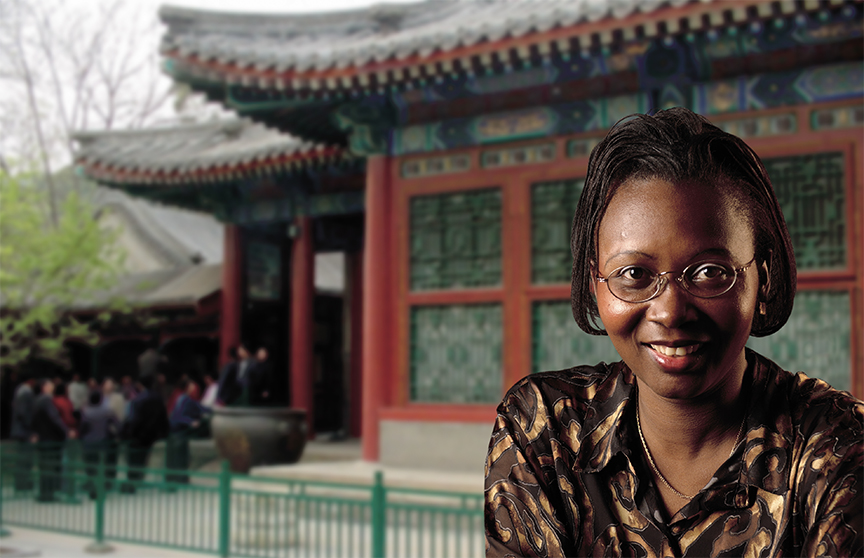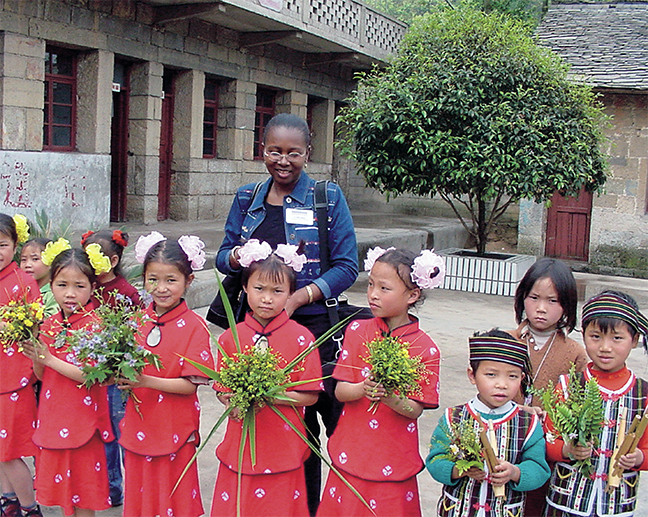
Born in Nigeria, educated in England, working in the United States and recently returned from China, Abiola Dipeolu makes every corner of the world, her corner of the world.
Abiola Dipeolu, the senior staff psychologist for WSU’s Counseling and Testing Center, had never been to China. But this spring, she traveled there as part of a U.S. delegation of psychologists sent to discuss learning impairments with their Chinese counterparts.
Although addressing learning disabilities and Attention Deficit Disorder can’t be counted at the top of China’s list of current social concerns, Dipeolu says the issue is becoming more of a priority. “If you follow Maslow’s hierarchy of needs,” she explains, “you’re going to strive to meet your most basic needs. You’re not going to worry about disabilities. You’re going to worry about food, clothing and shelter. China is still struggling to meet their population’s most basic needs.
They still need food and medicine. But today many Chinese psychologists are adopting western psychological concepts. They have a lot of questions because it’s still new to them.” She adds that Chinese psychologists — like those working in the West — are interested in learning not only how to most effectively diagnose problems but also how best to intervene and help individuals with add or a learning disability.
Those common goals created a sense of kinship between the Chinese and the American delegations of psychologists, and, Dipeolu says, that feeling carried over into their interactions with the wider population: “The common people are extremely friendly. While there is hype in the world about the differences between China and the United States — the idea of China trying to replace Russia as a ‘superpower,’ for instance — the Chinese people have a different perspective. If people can get past their governments and interact one on one, one person at a time, it does make a difference.”
During their stay in China, Dipeolu and the others in the U.S. delegation made time for sightseeing, visiting the Great Wall, among other quintessentially Chinese sites. Yet they also spotted signs of the Western world: the seductive throb of neon advertising and the temptations of fast-food joints and 24-hour bargain barns.
“There’s a push to embrace Western culture,” Dipeolu reports. “Having been raised in Africa, I can identify with that because many developing nations look up to the United States. And you can see that in China, in the way they dress and the way they gather around you as you go places.”
Of Place and Passion
In literature, surroundings are often used to reveal something about the internal life of characters: a couple who take a cruise on a tumultuous sea are surely having troubles.
Although it’s rarely productive to impose literary constructs on real-life situations and people, once you’ve sat in Dipeolu’s office in Grace Wilke Hall, it’s hard not to summon those fictive lessons.

schools for special needs children. She
says school teachers and administrators
are making every attempt to meet the
children’s needs, despite limited resources.
Sitting there, with shades drawn, beside a desk as orderly as a surgeon’s arsenal, free of the Post-it Note and memo ephemera that’s so much a part of office life, this is surely the work environment of someone who is highly disciplined.
And, as it turns out, it is. What you learn about Dipeolu after talking with her for some time is that she is disciplined. She is also ambitious, intellectually curious and has devoted her life to delving beyond surface perceptions to find her subject’s truest heart — whether that subject is an academic discipline, a part of the world or a person.
Dipeolu recalls that she’d already set her sights on a doctorate before she turned 10 years old. Her ambition and curiosity were most likely sparked, she notes, in the small hours of the morning, when she slid from slumber and crept down the hall to see the light still burning in her veterinarian father’s study.
“I loved history,” she reports, explaining that it was her first intellectual interest. That seems fitting, when you consider that history was being made all around her. British colonization had crumbled under the resistance of the Nigerian people, and post-colonialism held out the hope of a freer and more unified nation.
But Nigeria had long been a divided country. In the broadest strokes, the nation is divided in two: the south (Christian, contemporary) and the north (largely Islamic).
The country can then be subdivided into political, tribal and linguistic factions. “It was a time of trying to sort out our identity, deciding, ‘What is a Nigerian?’ But that’s a foreign concept. People will usually see themselves as a Hausa or a Yoruba. Even up until today we are still working through that. Our identity’s not crystal clear,” she says, her voice slowing for emphasis.
What was clear early on to the young Abiola was that men held power positions while women did not. But she also saw — thanks to her mother — that Nigerian women could, to some degree, take on nontraditional roles. Her mother, for instance, became an entrepreneur. Yet women’s roles in Nigeria have expanded very little through the years, Dipeolu notes.
But if roles for women were limited in her native country, personal goals within her own family were not. The intensity with which her father — a leading scholar in his field — pursued his work and the respect he garnered for his efforts inspired Dipeolu.
“I saw my dad and what he did, and I wanted to do something like that and influence society.” She first pursued history, but eventually landed in London to study law — a profession her parents and others had suggested to her.
But the law failed to capture her long-term interest. Even though she did not pursue her law studies, the experience, she says, was worthwhile. For one thing, the rigors of the British education system taught her some truly disciplined study skills. “British education,” she says, “is merciless.”
Then, despite being admitted to the London School of Economics, Dipeolu came to the United States and began studying psychology with an eye toward working with students. Her interest in counseling grew from there. While a graduate student at Florida State University, she began working at a career center and focusing on vocational psychology. There, she encountered a learning disabled student for the first time.
The experience proved something of an epiphany for her: “The student needed help in the area of career development. Not only did she present herself in a normal fashion, but she brought her psychological report along. Obviously, the student had made the connection: ‘If you’re going to help me, you’re going to need to know something about my disability.’ That got me thinking about learning disabilities and career development issues.”
She had found her professional focus.
About Options and Sense of Self
When Dipeolu speaks about career development for disabled students, her interest in the subject is evident. “Certainly, this aspect of career development has not been sufficiently explored,” she says. “While we have assessments and we’ve noticed disabilities, I don’t think I’ve ever seen a report that looked into how a disability would affect career choice and career development.”
Often, she notes, persons with learning disabilities or Attention Deficit Disorder have an underdeveloped sense of self and feel as though the choices available to them are limited. If they choose a career based on anything other than their true aptitudes and genuine interests, then, Dipeolu stresses, they have not fully dealt with their disabilities nor have the counselors they’ve worked with been truly successful in helping them overcome their handicaps.
She relates the story of one student who’d had great success in the social organizations he joined, but had drifted from one job to another, never rising high enough to distinguish himself and seeming to purposefully avoid opportunities for advancement.

the trip to China in spring 2002 visited
psychiatric hospitals and mental health
centers and held many meetings with
doctors and other health professionals.
“He came to me with the suspicion that he was stupid,” Dipeolu relates. “And when I called him and said that, in terms of his IQ, he was in the superior range, he couldn’t believe it.”
Making sure misperceptions like that don’t happen on her watch is Dipeolu’s mission at Wichita State.
Don Nance, associate professor of psychology and director of WSU’s Counseling and Testing Center, explains that Dipeolu’s primary professional goal is “helping people identify what options they have in pursuing their academic interests, despite their disabilities.” Susan Hendrich, WSU’s training coordinator for SRS, puts it this way: “She encourages people to pursue their passions.”
Dipeolu, Nance notes, has a lively sense of humor, but is also a very thorough person who focuses on finding the central problem in a client’s life. Yet, he adds, his colleague “doesn’t see a disability lurking behind every problem. She keeps a professional balance.”
Bridgette Hensley, the clinical psychologist program coordinator for Wichita Public Schools, interned under Dipeolu. “Dr. Dipeolu was very focused on my experience and professional growth,” Hensley says. “She’s an important advocate for students. I always knew she was in my corner.”
Indeed, Abiola Dipeolu has made a difference in many corners of the world — and in many corners of people’s lives.





